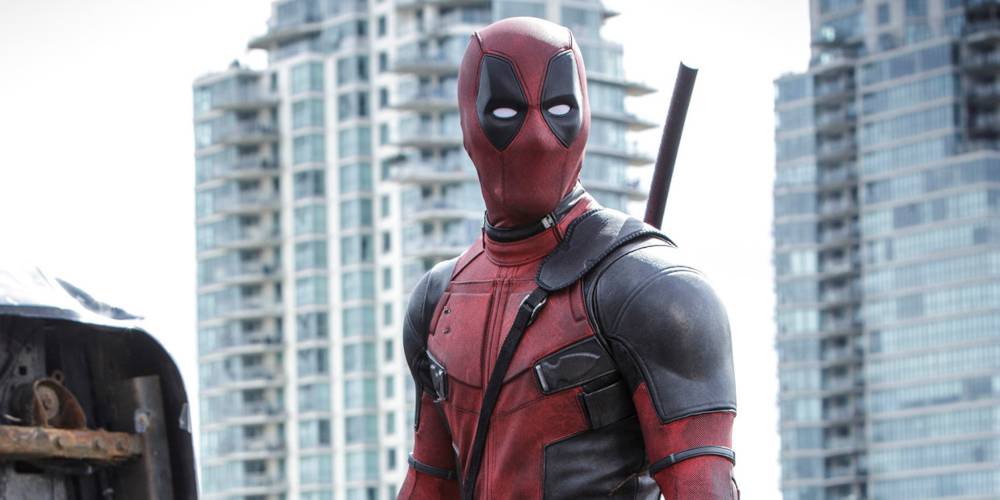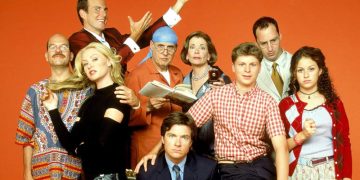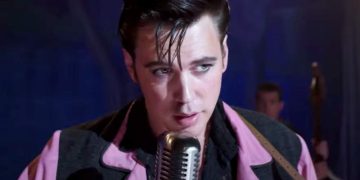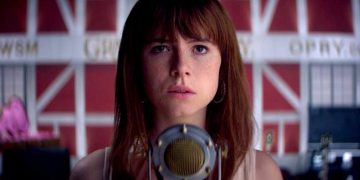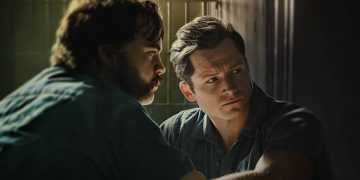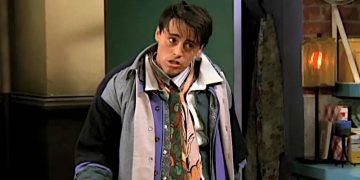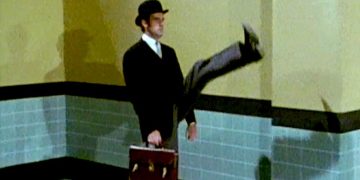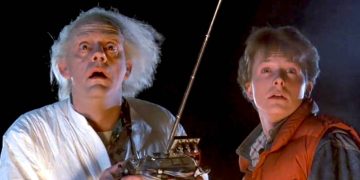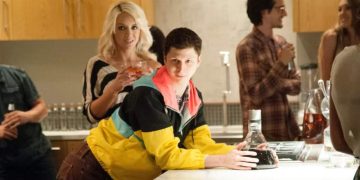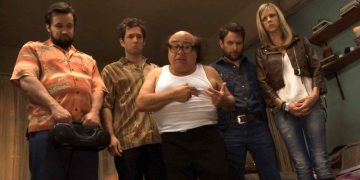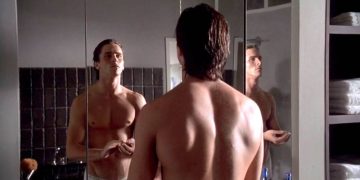You've likely heard the term "fourth wall" before. But what exactly is it? And what do people mean when they say "breaking the fourth wall"?
The term originates from theater and stage plays, where the "fourth wall" was the invisible wall separating the performers from the audience, with the other three walls being the walls of the stage.
In theaters, actors pretend to ignore the invisible fourth wall (or, more accurately, they pretend that there is a real wall there). To them, the audience doesn't exist. We're looking in from the outside as the characters live out their fictional experiences.
But every so often, an actor might actually address the audience—and they do so by speaking at us through the invisible wall. In other words, they break through that fourth wall.
This idea has made its way to movies and TV shows, with the camera itself being the invisible fourth wall barrier between performers and audience. The screen is the stage, and the actors pretend as if their world is real.
Voice-over narration is a type of fourth-wall break, but more frequently the term is used to describe when characters actually look into the camera and address the audience.
Breaking the fourth wall allows actors to breech the unspoken rules of the "stage" to communicate directly with the viewer. This can be done for comedic effect, to relay omniscient information, or to develop a character and build their bond with the viewer.
Let's explore some of the best examples of breaking the fourth wall in movies and TV shows!
13. Malcolm in the Middle (2000)
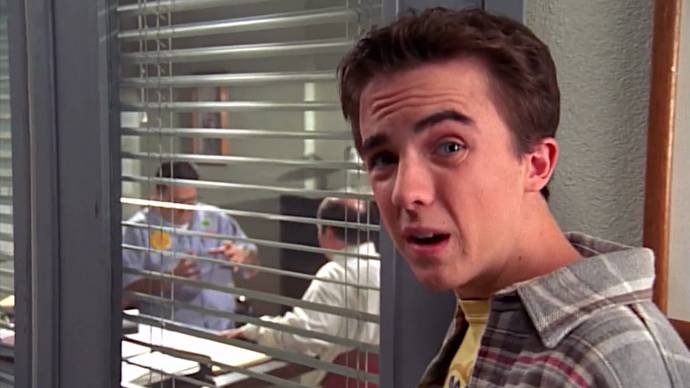
Created by Linwood Boomer
Starring Frankie Muniz, Bryan Cranston, Jane Kaczmarek
Comedy, Family
151 episodes (7 seasons)
Malcolm in the Middle is an iconic sitcom of the 2000s, centering on a family of six, set in a suburban Californian home where the money is tight and the antics are endless.
Like most sitcoms, the family in question is dysfunctional at best, with a ruthlessly strict mother, a dopey father, and four misbehaving boys (until later when a fifth is born).
The middle child of Lois (played by Jane Kaczmarek) and Hal (played by Bryan Cranston) is Malcolm (played by Frankie Muniz), the only character in the show to break the fourth wall.
Malcolm is a genius child prodigy whose nerdy intelligence doesn't stop him from stealing, fighting, and getting into trouble. We witness the show from his angsty and egotistical POV, who opens and closes every episode with a rundown of his thoughts at the dinner table.
12. High Fidelity (2000)
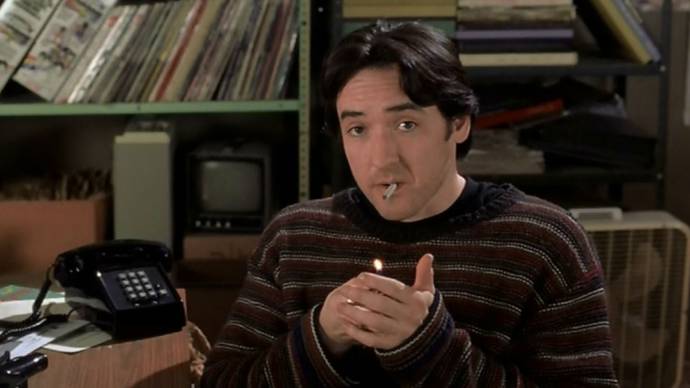
Directed by Stephen Frears
Starring John Cusack, Iben Hjejle, Todd Louiso
Comedy, Drama, Music (1h 53m)
"Did I listen to pop music because I was miserable, or miserable because I listened to pop music?" John Cusack's character asks us, philosophically, in High Fidelity.
Playing the chronically-single record store owner Rob, Cusack opens High Fidelity by directly addressing the audience, and that immediately sets the tone of the movie: Rob is mopey and miserable, but deeply connected to (and a little snobbish about) music.
Rob talks to the audience as a way to reason, rant, and cope with his life situation. Breaking the fourth wall is Rob's version of self-reflection. It's therapeutic, even.
This gives us a deeper insight into the workings of his mind, which is constantly reeling between bitterness and motivation. It's as if he's talking to himself and we're listening in.
High Fidelity was recently remade as a romantic comedy TV series starring Zoe Kravitz. From the trailer alone, we can see it adopts the same approach as the original movie, with Kravitz explaining her life to the audience as she goes about her daily life.
11. Filth (2013)
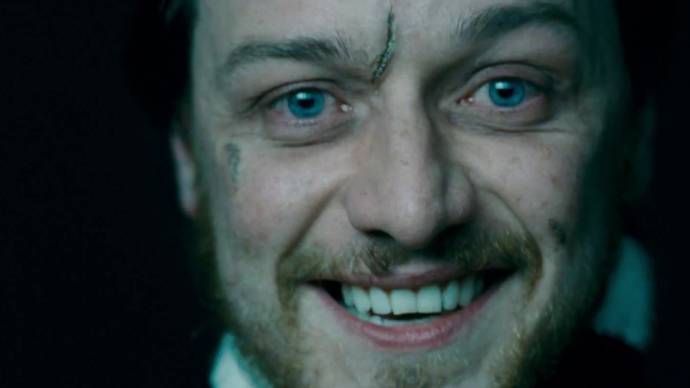
Directed by Jon S. Baird
Starring James McAvoy, Jamie Bell, Eddie Marsan
Action, Comedy, Crime (1h 37m)
The friendly face of James McAvoy is roughened at the edges in Filth, where he plays a corrupt and misanthropic cop who's permanently pumped with drugs and booze.
Fun fact: James McAvoy reportedly drank a load of Scotch before each night of filming so he could really embody that hungover, groggy look.
Playing a character as self-centered as Bruce, it seems fitting that he should break the fourth wall. He isn't just the main character of his own story, but the whole world.
Bruce is sly and manipulative; it's only us, the audience, who get to see the truth behind what he's doing.
He's built walls around himself so high that nobody really notices that he's on the verge of a nervous breakdown, that he secretly cross-dresses as his former wife, that he kills a suspect.
In the final scene, Bruce is given a second chance as he attempts to hang himself. While he's deeply alone, the wife of a man he tried to save appears at the door, which signals his one last chance for personal redemption.
Alas, Bruce looks to us and utters his motto: "Same rules apply." Then, he takes the leap. In the end, he refuses to break down the wall (no pun intended) that separates him from society—one which only we can see via the fourth wall.
10. This Is Going to Hurt (2022)
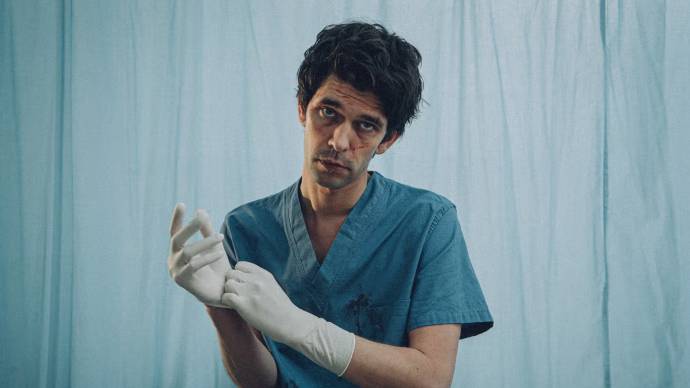
Created by Adam Kay
Starring Ben Whishaw, Ambika Mod, Rory Fleck Byrne
Comedy, Drama
7 episodes (1 season)
This Is Going to Hurt is one of those shows that lure us in with a false sense of security, introducing our workaholic doctor protagonist with a sarcastic and witty sense of humor. Then: tragedy hits.
The British medical comedy takes a dark turn towards the end of the series, which hits even harder thanks to the show's use of realism.
Ben Whishaw plays the central doctor in the "obs and gyny" labor ward, who struggles to maintain a work-life balance.
The BBC adaptation of Adam Kay's memoir presents us with an authentic depiction of the overloaded and underpaid NHS, and it's only he who breaks the fourth wall.
Most of Adam's witty one-liners and mocking expressions that he shoots to the camera make us laugh. There's only one exception to the show's fourth-wall rule: when his co-worker Shruti Acharya (played by Ambika Mod) speaks to us a poignant line before a severe plot twist.
9. The Wolf of Wall Street (2013)
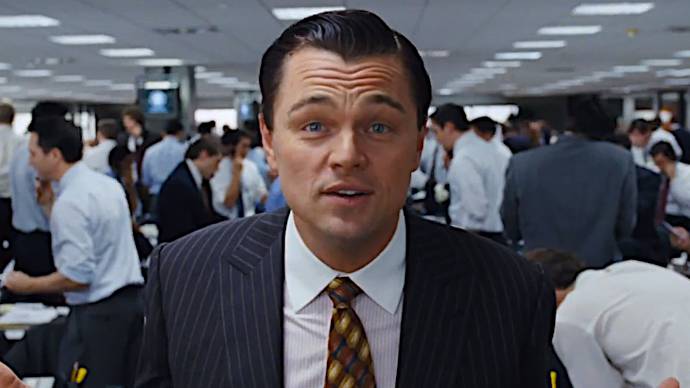
Directed by Martin Scorsese
Starring Leonardo DiCaprio, Jonah Hill, Margot Robbie
Biography, Comedy, Crime (3h)
The Wolf of Wall Street is based on a true story, which Leonardo DiCaprio narrates to us as Jordan Belford. Basically, it's a live-action biography—and it works really well.
Jordan is an egomaniac who sees himself as better than everyone around him. Therefore, it makes sense that he views himself as a star in a film—one that the whole world is eager to watch. This is fair enough, as he does live a pretty wild life.
The millionaire led a drug-filled life of yachts and parties before serving 22 months in prison for money laundering.
Before all that, though, Jordan flaunts his money to both us and other characters. He describes in detail how he rigged the system, boasting about his skills like some sort of business king.
Martin Scorsese breaks the fourth wall to not only relay information—like how Jordan fought off investigations for so long—but to make us laugh. The Wolf of Wall Street has one of the highest swear counts in cinematic history, many of which are spoken directly to us.
Is it entertaining to watch? Yes. Is it a reflective insight into Jordan's explicit and daring lifestyle? Also, yes.
8. Miranda (2009)
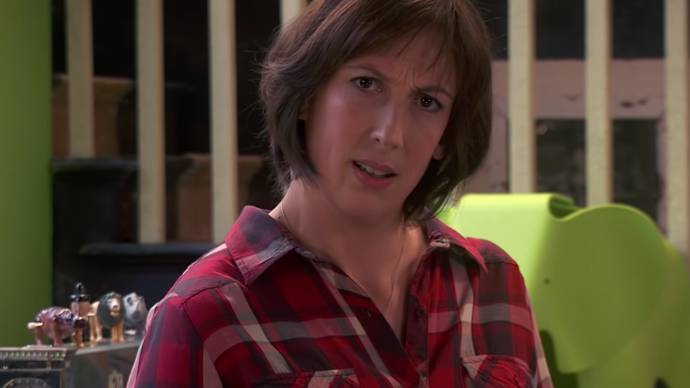
Created by Miranda Hart
Starring Miranda Hart, Patricia Hodge, Tom Ellis
Comedy
20 episodes (3 seasons)
Miranda might not be a Hollywood blockbuster, but the BBC sitcom was a huge hit with UK viewers. The main reason it was so popular? Miranda Hart's creative use of the fourth wall.
The heartwarming nature of the show benefits greatly from Miranda's personal relationship with the viewer. She welcomes us as a friend to join in on her wacky adventures, looking to us in her most awkward and embarrassing moments.
Miranda "cracks the screen" with a personal message at the beginning of each episode. She gives an update of her life currently—as if catching up with a friend over coffee—and ends on an endearing phrase: "Onward with the show, my chums!"
We're kept in the loop throughout the show, with Miranda delivering little side comments to us that the other characters can't hear. It's light, personable, and funny—just what Miranda is all about.
7. Annie Hall (1977)
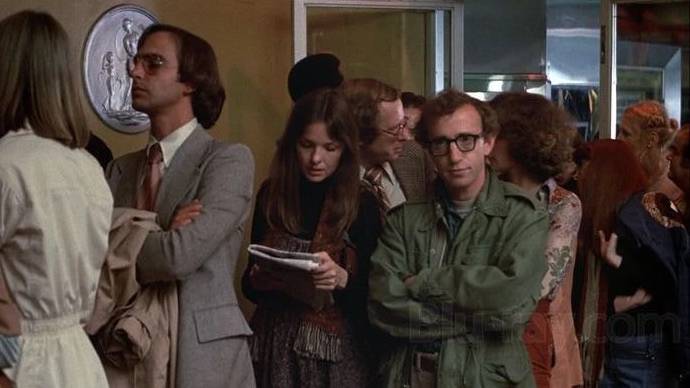
Directed by Woody Allen
Starring Woody Allen, Diane Keaton, Tony Roberts
Comedy, Romance (1h 33m)
Annie Hall opens with a monologue from Woody Allen, who quotes (bad) jokes and talks about his mid-life crisis. The whole thing feels natural and real, as if he were chatting with us in real life.
It's an unusual way to open a film, but it immediately draws us in. The nonchalant and chatty vibe of Annie Hall is set in motion here. The rest of the film plays out like a meandering conversation, similar to other films of the French New Wave.
Allen continues chatting to us and the characters alike, usually about things like Freud and modern relationships and movies. He even enters his own flashbacks at one point, talking to his old classmates with his six-year-old self stood at the front.
One of the most famous scenes takes place in a movie theater, where Alvy (played by Allen) moans to us about a man in the queue.
"Wait a minute, why can't I give my opinion? It's a free country," the man interjects, also breaking the fourth wall. This is highly unusual, as other characters usually can't hear what the protagonist is saying when they speak to us.
Alvy then proceeds to bring out the philosopher Marshall McLuhan (playing himself), who's hiding in the shot the entire time, to prove Alvy's point. This completely destroys any notion of a fourth wall, which Allen rebuilds in the next scene as if nothing happened.
6. Monty Python and the Holy Grail (1975)
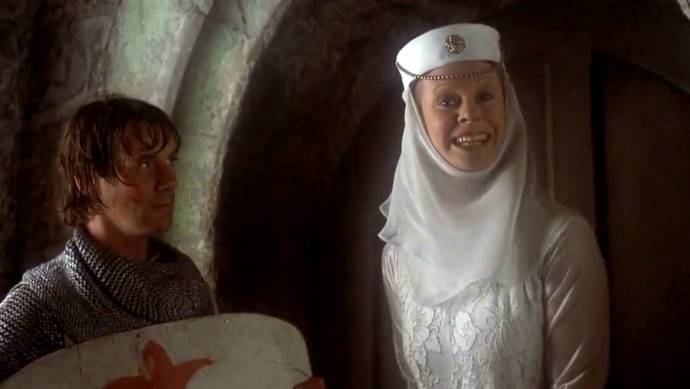
Directed by Terry Gilliam and Terry Jones
Starring Graham Chapman, John Cleese, Eric Idle
Adventure, Comedy, Fantasy (1h 31m)
The very British trilogy of Monty Python movies (which is itself an offspring of the comedy sketch show) is packed with meta-references and direct address.
The theater-like interlude in Monty Python's The Meaning of Life welcomes viewers to "the middle of the film" while Monty Python and the Holy Grail asks us, "Do you think this scene should have been cut from the film?"
In fact, the scene was cut from the film, back when breaking the fourth wall was less acceptable in cinema. Luckily, the DVD extended cuts include this hilarious self-reference. "Get on with it," the characters then shout—even ones we haven't met yet!
Mid-way through an animation, the narrator of The Holy Grail claims, "Suddenly, the animator had a heart attack." The film cuts to a live-action shot of an animator comically collapsing off his chair, shattering the film's Middle Age setting.
And there's tons more where that came from! Monty Python's Life of Brian ends on a finale of men crucified, who are all singing "Always Look on the Bright Side of Life" while hanging from their crosses. Mid-song, we're told that "this record's available in the foyer!" Sold.
5. Ferris Bueller's Day Off (1986)
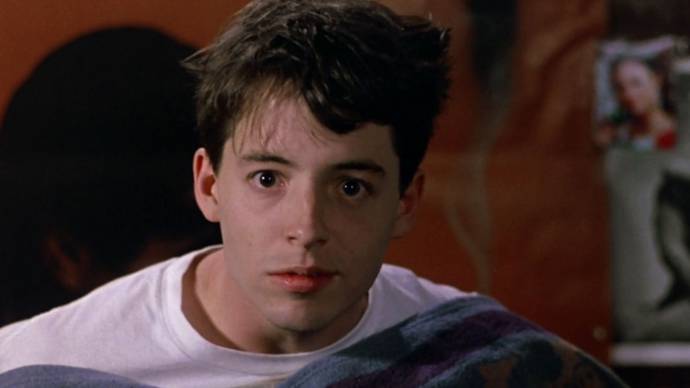
Directed by John Hughes
Starring Matthew Broderick, Alan Ruck, Mia Sara
Comedy (1h 43m)
Ferris Bueller's Day Off is an obvious choice for this list. The post-credit scene is highly referenced in pop culture, where Matthew Broderick tells the audience: "The movie's over. Go home."
This isn't the first time Ferris breaks the fourth wall—he does so throughout the entire movie—but it is the first time the movie is called out as being a movie.
When faking illness to nab the "day off" in question, Ferris lists the methods you can use—and the techniques are listed beside him on-screen, like faking stomach cramps and licking your palms.
One could argue that Ferris Bueller's Day Off is such a classic movie because of its disregard for the fourth wall. Ferris talks more to us than he does his girlfriend, mainly about the teenage woes of parents and not getting a car for his birthday.
4. The Big Short (2015)
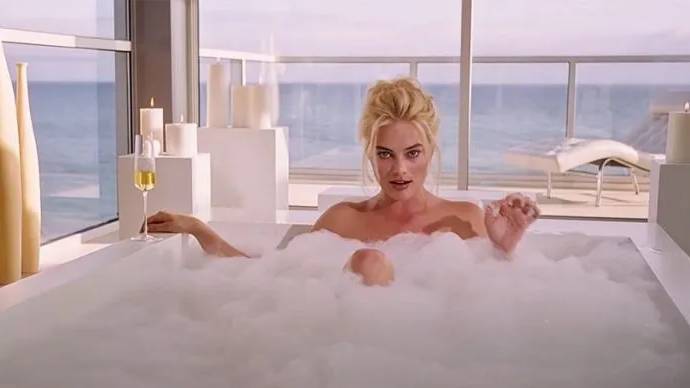
Directed by Adam McKay
Starring Christian Bale, Steve Carell, Ryan Gosling
Biography, Comedy, Drama (2h 10m)
The Big Short is a very technical film that's full of business jargon. It's the kind of premise that could be a snooze fest, if done badly. But luckily for us, director Adam McKay takes creative approaches to relaying all this dull-but-essential information.
For the most part, Ryan Gosling's character does most of the explaining as he demystifies the hazy world of banking to us average-Joe viewers. His tone is somewhat patronizing, but that keeps in line with the snobbery of his corporate world.
Yet when the stylish and suited Gosling isn't breaking down the plot for us, celebrity cameos are used to fill us in on complicated terms.
Margot Robbie drinking champagne in a bubble bath and Selena Gomez paying blackjack with Richard H. Thaler aren't your usual plot devices, but they sure pack a unique twist.
When stars like these unexpectedly appear as themselves in non-sequiturs to explain the intricacies of Synthetic CDOs and how they're being exploited, it's a little easier to pay attention.
3. Peep Show (2003)
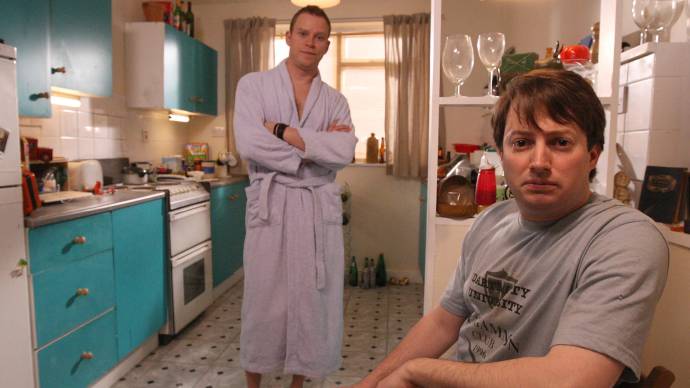
Created by Jesse Armstrong, Andrew O'Connor, and Sam Bain
Starring David Mitchell, Robert Webb, Matt King
Comedy
54 episodes (9 seasons)
Peep Show doesn't just break the fourth wall—it absolutely demolishes it. The one-of-a-kind sitcom has a format like no other: we watch all nine seasons entirely through the POV of its characters.
Chiefly, we look through the eyes of Mark (played by David Mitchell) and Jez (played by Robert Webb), two polar-opposite London housemates who are perpetually down on their luck.
Peep Show is famous for filming through headband cameras, giving a strange fish-eye feel that presents exactly what each character sees. It takes a few episodes to get used to, but it's totally worth it for the hilarious (and cringey) mishaps the duo get into.
It's impossible to have a conversation about Peep Show without quoting it. "The secret ingredient is crime," "It was a Christmas joke, Mark," and "Tell you what, that crack is really moreish..." are common lines thrown about during pub chats.
None of these memeable moments would be possible without the inner monologues of Mark and Jez being narrated to us.
Although they might not be looking at an audience, they're still technically looking into the camera for most of the shots. (Which is also what makes the kissing scenes so uncomfortable...)
2. Deadpool (2016)
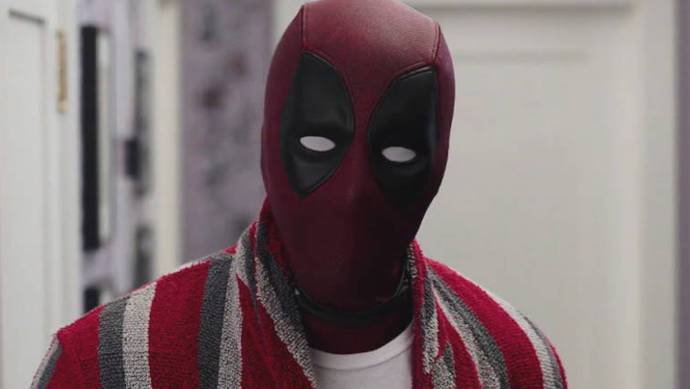
Directed by Tim Miller
Starring Ryan Reynolds, Morena Baccarin, T. J. Miller
Action, Comedy (1h 48m)
Deadpool constantly breaks the fourth wall—not just in his movies, but in his comics and video games as well (though originally he didn't). This simple but effective act gives Deadpool a whole new dimension, almost as if it were a characteristic of Deadpool himself.
Deadpool is an anti-hero with an edge, fighting bad guys in spandex yet always making crude jokes and thriving off violence. Ryan Reynolds proved the perfect fit for this less-than-super-hero, who first appeared on screen in 2009's X-Men Origins: Wolverine.
Here, breaking the fourth wall is mostly used in two ways: either to narrate the story, or for comedic effect.
As Deadpool's whole persona is built on dark comedy, breaking the fourth wall is an excellent choice for him. He does this primarily by cracking sex jokes and making self-referential jabs about Hollywood and the MCU franchise.
Deadpool even references the fact that he's in a movie. This doesn't seem so radical given the nature of fourth-wall breaks, but many films that break the fourth wall still act as if the character is talking to a friend or vague presence without realizing they're in a movie.
And the post-credit scene in Deadpool even mimics the famous fourth-wall break of Ferris Bueller's Day Off, where he tells the audience to go home in the same stripey robe.
1. Fleabag (2016)
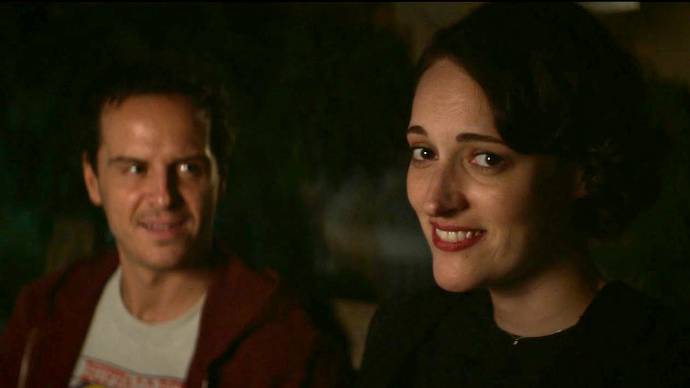
Created by Phoebe Waller-Bridge
Starring Phoebe Waller-Bridge, Sian Clifford, Andrew Scott
Comedy, Drama
12 episodes (2 seasons)
Phoebe Waller-Bridge, creator and star of Fleabag, creates an intimate relationship with her viewers by talking right to the camera.
The show follows an eccentric, single woman in the modern world, who talks to us as if we're her best friend or personal diary. Sarcastic looks and flirty winks thrown our way express her thoughts to us.
When a therapist asks if she has any friends, she replies that "they're always there," referencing the symbolic presence of the audience.
Waller-Bridge even takes breaking the fourth wall one step further by having another character join in on it:
Andrew Scott appears in season two as the "hot priest" who Fleabag falls for. As the only character who can match Fleabag's level of intellect and humor, he's also the only one who's able to break the fourth wall.
The priest's relationship with the invisible "God" with whom he talks? That mirrors Fleabag's relationship with the invisible "us." The priest asks Fleabag "Where did you go?" and looks dead into the camera—which not only surprises the audience, but also Fleabag.
By disrupting the rules of the show's world, Fleabag's lonely existence (masked by her humor) is brought under light.
Honorable Mentions
Still not satisfied? Here are some more honorable mentions for other movies and TV shows that break the fourth wall in creative ways:
- Alfie (1966)
- Spaceballs (1987)
- Goodfellas (1990)
- Kuffs (1992)
- Wayne's World (1992)
- Austin Powers: The Spy Who Shagged Me (1999)
- Fight Club (1999)
- Amélie (2001)
- 24 Hour Party People (2002)
- Kiss Kiss Bang Bang (2005)
- I, Tonya (2017)
